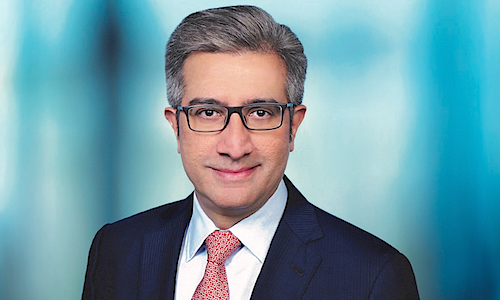Switzerland's second-largest bank faces extreme highs and lows in the space of a week. Is the worst over?
The past week was one of very sharp contrasts. While Credit Suisse seemed to languish at home, it celebrated an important success in Singapore.
Benjamin Cavalli, the head of the Asia wealth management business, was given an «IBF Distinguished Fellow» award by the influential Institute of Banking and Finance (IBF) for his years of service in the region.
The award is conferred on individuals in the financial sector that make a substantial contribution to the Singaporean financial sector. It proved to be a short but welcome respite for staff and managers at the bank who are under seemingly constant pressure.
Critical Questions
The negative headlines the bank faces are also being felt in Asia, as many employees indicate. They face critical questions from clients. But none of them think, in contrast to Switzerland, that the bank could actually go under.
Credit Suisse isn't a national champion to anyone between Hong Kong and Singapore, just another financial giant. They are like any of the other global players who go through their highs and lows in the same way that UBS, Deutsche Bank, and Citigroup have.
Important Signal
There was also a certain irony in the fact that Credit Suisse bought back about $3 billion in its own debt on the same day Cavalli was given the award, as finews.com reported. The step may prove to be a turning point in the future.
The bank signaled two things. One that it was cutting its future interest expenses and. two, that it had the necessary capital strength to buy back the bonds.

The surprising coup has the handwriting of Dixit Joshi (image above) all over it. He is Credit Suisse's new group chief financial officer, and he started working at the bank just this October. His step proved that the bank is capable of acting quickly, something that could prove as an advantage in the next few weeks and months.
Shares Up
Buying back the bonds took the air out of any speculation of any kind of insolvency or default, even a possible «Lehman moment» given the sharp increase in credit default swaps (CDS) spreads. The market knew what to do with that and the share price rose by 20 percent in the week after the news came out. But does this mean that Switzerland's second-largest bank has reached the bottom?

It is still too early to say. At least given that the scope of the expected restructuring announced on 27 October is not yet known. In any case, a convincing strategy will need at least two years – in the best case – to gauge whether it is successful or not. That is a very long time, and one that will be enormously challenging for CEO Ulrich Körner (image above) and his top lieutenants. That is why everyone should be paying very close attention to what is happening now – as a way of better assessing the chances of success in the future.
Capital Strength
There was another important development last week. As finews.ch (German only) reported, S&P left its Credit Suisse ratings unchanged despite the turbulence the bank has experienced in the past few months and its uncertain near-term outlook. According to the rating agency, the bank remains committed to keeping strong liquidity buffers while making proactive efforts to reduce its legacy issues, including those related to litigation.
The bank has also taken significant steps to strengthen risk management while proceeding with its digital transformation efforts, which should help it become more efficient.
Swiss Cuts
But all the measures above won't be enough to pay for the expected restructuring. Against this, the money it gets from any businesses that it sells is critical. That is likely to include a massive shrinking of the investment banking business, further savings domestically (image below) as well as the disposal of wealth management units that are not based in core markets, as UBS has already done.

That will all be decisive in deciding how much money is then needed from any possible capital increase. Although some analysts believe the step is unavoidable, senior management is likely to keep the possibility of one remote. It will be difficult to execute, not least given that new capital will dilute current shareholders.
Low Valuation
JP Morgan analyst Kian Abouhossein thinks the restructuring is possible without a capital increase. He points to the fact that the bank has a global wealth management business with private client assets under management of between $660 and $700 billion (it reported 661.5 billion francs on 30 June, roughly equivalent to $665 billion), and one that is not properly reflected in its current market valuation.
But he also underlined that any restructuring without a capital increase is only possible when parts of the bank's business are sold off.
Onshore Presence
Credit Suisse will not become successful only by acting defensively. Strategic initiatives are critical, particularly in its key growth market of Asia. That is the only market outside of Switzerland and Europe where it provides a complete offering of products and services.

But in Asia (Singapore office shown above) Credit Suisse will need an investment bank in order to fulfill the needs of the super-rich. Few other banks have the onshore presence that it has in wealth management, where it has businesses in Australia, Japan, India, Singapore, and Thailand. About a third of all managed client assets in wealth management are booked in Asia.
That means the business has to extend far beyond the reaches of Paradeplatz in Zuerich and that it can only survive as a global institution if it manages to score in Asia.



























